The Storyteller (5 page)
Authors: Walter Benjamin

The Second Self
A New Year's Story for Contemplation
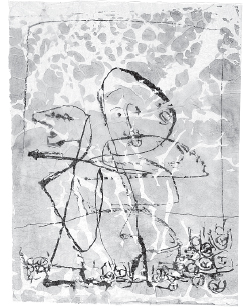
Public Duel (Ãffentliches Duell)
, 1932.
K
rambacher is a rather dwarfish clerk and moreover a man âwith no attachments', as he assures the landladies of the furnished rooms, which he changes every four to six weeks. For several weeks he has been wondering where he might spend New Year's Eve. But all his arrangements have fallen through. With the last of his money he has bought two bottles of punch. From nine o'clock onwards he starts a lonesome binge in the
constant hope that his doorbell might ring, that somebody might call on him to keep him company.
His hopes are dashed. Just before eleven he heads out. He got cabin fever. We follow his uncannily lilting stride through the nocturnal streets. It is obvious that he has been drinking. Maybe he is not even really walking; maybe he is only dreaming that he is walking. This suspicion may arise fleetingly in the reader.
Krambacher enters a secluded alley. A dim light attracts his attention. A dubious looking tavern, open on New Year's Eve? But why so quiet? He goes nearer; no trace of a tavern: faded wood lettering above a whitewashed shop window from which the milky light seeps spell: IMPERIAL PANORAMA.
He wants to pass by but a mucky piece of paper in the window holds him back:
Today! Gala performance. Journey through the old year!
Krambacher hesitates, timidly opens the door and, since he cannot see anyone, rallies himself to enter. There stands the Imperial panorama. Now it is described with the thirty-two chairs in a round. On one of these chairs the owner â a widowed Italian, Geronimo Cafarotti â is asleep. As the guest approaches he leaps to his feet.
Great gush of words. One can gather from his speech that every evening the place is sold out; today, coincidentally, few guests despite the gala performance; âbut I knew that someone would come: the right one.' While he urges the visitor onto a stool before two peepholes, he explains: âHere you are going to make a curious acquaintance; you will see a gentleman who bears no resemblance to you: your second self. You have spent the evening reproaching yourself, you have an inferiority complex, you feel inhibited, you blame yourself for not following your impulses. Well, what are these impulses? That's the pressure of your second self on the handle of the door that
leads to your life. And now you will recognise why you keep this door closed, have inhibitions, don't follow your impulses.'
The journey through the old year begins. Twelve images, each with a caption; in addition, the explanations of the old man who slides from one chair to another. The images:
The path that you wanted to take
The letter that you wanted to write
The man that you wanted to rescue
The seat that you wanted to occupy
The woman that you wanted to follow
The word that you wanted to hear
The door that you wanted to open
The costume that you wanted to wear
The question that you wanted to pose
The hotel room that you wanted to have
The opportunity that you wanted to seize
On some of the images the second self can be seen, on others only the situations in which it wanted to embroil the first. The images are described just as they begin to detach from their positions with a quiet ringing, allowing subsequent ones to take their place. Barely have they settled with a quiver when they already begin to make way for a new one. The last ringing is submerged in the clanging of the New Year's bells. Krambacher wakes up in his chair, an empty punch glass in his hand.
â
Translated by Sebastian Truskolaski
.
Written c. 1930â3; unpublished in Benjamin's lifetime.
Gesammelte Schriften VII
, 296â8.
Dreams from Ignaz Jezower's
Das Buch der Träume
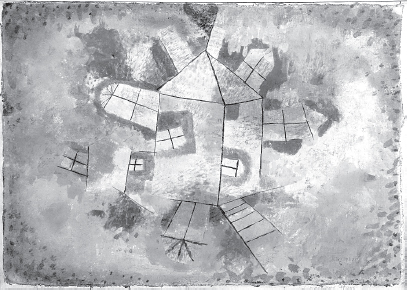
Revolving House (Dreh Haus)
, 1928.
I
n the dream â I dreamt it for three or four days, and it won't leave me â there was a country road in front of me in the darkest twilight. Tall trees lined both sides, and on the right-hand side it was bordered by a wall that soared high. While I stood in a group of people, the number and sex of which I no longer know (just that there was more than one), at the opening to the road, the ball of the sun appeared faintly between the trees, almost covered by the foliage, as white as mist and without any radiating force, and without becoming
noticeably brighter. As fast as the wind I rushed on my own along the country road in order to be blessed by a more open view; then, in a moment, the sun vanished, neither sinking nor behind clouds, rather as if it had been extinguished or removed. Instantly it was a black night; rain, which completely softened the road under my feet, began to fall with tremendous force. Meanwhile, I wandered around, feeling nothing. Suddenly part of the sky flashed white, neither from the sunlight nor from the lightning â I knew it as âSwedish light' â and one step ahead of me lay the sea, into the middle of which led the road. Beatified by the brightness that I had now indeed attained and the timely warning of danger, I ran triumphantly back along the street in the same storm and darkness.
*Â Â Â Â Â *Â Â Â Â Â *
I dreamt of a student revolt. Sternheim
1
somehow played a role, and later he gave a report of it. In his papers, the sentence appeared word for word: When one sifted the young thoughts for the first time, one found well-fed brides and brownings [
Bräute und Brownings
].
â
Translated by Sam Dolbear and Esther Leslie
.
First published in Ignaz Jezower's anthology
Das Buch der Träume
(1928), a volume that includes other dreams by Benjamin, dreams that also appear in
One Way Street
(1928).
Gesammelte Schriften IV
, 355â6.
Too Close
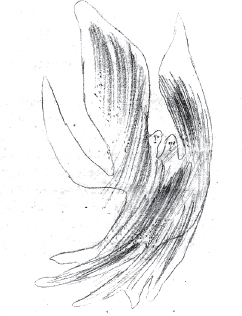
Angel Couple (Engelpaar)
, 1931.
I
n the dream, on the left bank of the Seine in front of Notre Dame. I was standing there, but there was nothing that resembled Notre Dame. A brick building towered above a high fence made of wood, revealing the extremities of its highest echelons. I stood, though, overwhelmed, right in front of Notre Dame. And what overwhelmed me was longing. Longing for the very same Paris in which I found myself in the dream. But where does this longing come from? And where does this
disfigured, unrecognisable object come from? The reason being I came too close to it in the dream. The tremendous longing which had struck me here, in the heart of that which was longed for, did not press itself from the distance into an image. It was a blissful one, which has already crossed the threshold of the image and property, and knows only the power of the name, from which the lover lives, transforms, ages, rejuvenates and, imageless, is the refuge of all images.
â
Translated by Sam Dolbear and Esther Leslie
.
Written in 1929; published in the cycle âShort Shadows I' in
Gesammelte Schriften IV
, 370; also translated in
Selected Writings II
, 269.
Ibizan Dream
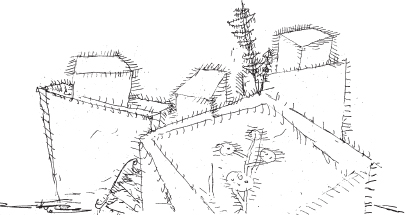
West-Eastern Village (Westöstliches Dorf
), 1925.
A
dream from the first or second night of my stay in Ibiza: I went home late in the evening â it was actually not my house, but rather a splendid rental house, in which I, dreaming, had accommodated Seligmann. There I encountered a woman, hurrying towards me from a side street in close proximity to the entrance of the house, who whispered, in passing, as fast as she moved: âI am going for tea, I am going for tea!' I didn't pursue the temptation to follow her, but rather stepped into the house of S, where an unwelcome scene immediately transpired, in the course of which the son of the house grabbed me by the nose. With resolute words of protest, I slammed the
house door shut behind me. I was hardly outdoors again when, on the very same street, with the very same words, the very same wench sprang at me and this time I followed her. To my disappointment, she wouldn't let anyone talk to her; rather she hurried away at a steady pace down a somewhat sloping alley, until she made the closest of contact, in front of an iron railing, with a whole bunch of whores, who were obviously standing at the entrance to their district. A policeman was positioned not far from there. In the midst of so much embarrassment, I awoke. Then, it crossed my mind that the girl's arousing, strangely striped silk blouse had gleamed in the colours green and violet: the colours of Fromms Akt.
1
â
Translated by Sam Dolbear and Esther Leslie
.
Diary entry, Ibiza, written 1932;
Gesammelte Schriften VI
, 447.
Self-Portraits of a Dreamer
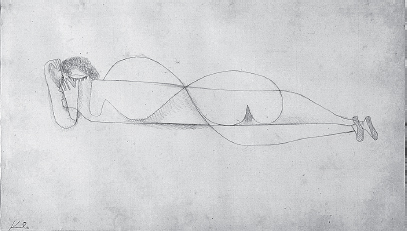
In Readiness (Bereitschaft)
, 1931.
A
trip to Grandmother's had been decided on. A cab was taken. It was evening. Through the panes of the carriage doors I saw light in some of the houses of the old West End. I said to myself: that is the light from
that
time; exactly the same. But it wasn't long before I was reminded of the present by a whitewashed facade that broke into the front of old terraced houses, which were still unfinished. The cab crossed Potsdamer Strasse at the intersection with Steglitzer. As the carriage continued along the other side of the road, I asked myself suddenly: how was it before, when grandmother was still alive? Were there not little bells on the horse's yoke? I need to listen
out for whether or not they still exist. In the same moment I sharpened my ears and I actually heard little bells. At the very same time the cab appeared not to roll but to glide over the snow. Snow now lay on the road. The houses shifted their oddly formed roofs up close together so that only a small strip of sky was visible between them. There were clouds capped by roofs, which were shaped like rings; I thought to point to these clouds and was astonished to hear them name âmoon' before me. In grandmother's apartment it turned out that we had brought everything we needed for refreshment. On a tray raised high, coffee and cake were carried along the corridor. In the meantime, it had become clear to me that we were approaching grandmother's bedroom, and I was disappointed that she was not yet up. I was soon inclined to surrender myself there. So much time had passed meanwhile. When I entered the bedroom, a precocious girl lay there in a blue robe that was no longer fresh. She was not covered, and she seemed quite comfortable in the wide bed. I went out and saw six or more cots next to each other in the corridor. In each of these beds sat a baby who was dressed as an adult. I had no choice but to internally count these creatures among the family. This perplexed me and I awoke.
A
bove a great city. Roman arena. At night. A chariot race takes place, it was â as a dark consciousness told me â about Christ. Meta stood in the middle point of the dream-image. From the seats of the arena the hill descended steeply down to the city. I encounter a rolling streetcar at the foot of the hill, on the rear platform ledge of which I notice a close female acquaintance wearing the red, burnt garments of the
damned. The coach rushed off, and suddenly before me stood her boyfriend. The satanic features of his indescribably beautiful face emerge as a cautious smile. In his raised hands, he holds a small stick and, with the words, âI know that you are the Prophet Daniel', he smashes it over my head. In this moment, I became blind. Then we continued to go downhill together into the town; soon we were in a street which had houses on the right side, and open fields on the left, and at its end a gate. We walked towards it. A ghost appeared in the window of the ground floor of a house that was on our right. And as we continued, it accompanied us in the interiors of all the houses. It went through all the walls and always stayed with us on the same level. I saw it despite being blind. I felt that my friend suffered under the gaze of the ghost. Then we changed places: I wanted to be next to the row of houses and shelter him. As we reached the gate, I woke up.
I
was out with my girlfriend. We had undertaken something between mountain hiking and strolling, and we were now approaching the summit. Oddly enough, I thought to recognise it by a very high pole that was thrusting obliquely towards the sky, which, looming from the overhanging cliff wall, overlapped with it. When we reached the top, there was no summit, but rather a high plateau, over which went a wide street with rather tall ancient houses on both sides. At once we were no longer on foot but in a car, driving along this street, sitting next to each other on the backwards-facing seat, as it seemed to me; perhaps the car's direction of travel changed while we sat inside. Then I leaned over my beloved in order to kiss her. She didn't offer me her mouth, but rather her cheek. And while
I kissed her, I noticed that this cheek was of ivory and was permeated along its whole length by black, ornately radiating veins, which struck me because of their beauty.
I
see myself in the Wertheim department store in front of a flat little box with wooden figures, such as a little sheep, just like the animals that made up Noah's Ark. But this little sheep was much flatter and made of a rough, unpainted wood. This toy lured me. As I let the salesgirl show it to me, it transpires that it is constructed like a magic tile, as found in many magic boxes: these little panels are loose and shift, all turning blue or red, according to how the ribbons are pulled. This flat, magical wooden toy grows on me all the more after I realise this. I ask the salesgirl the price and am most astonished that it costs more than seven marks. Then I make a difficult decision not to buy. As I turn to go, my last glance at it falls on something unexpected. The construction has transformed. The flat panel rises steeply upwards as an inclined plane; at its end is a door. A mirror occupies it. In this mirror I see what is playing out on the inclined plane, which is a road: two children run on the left side. Otherwise it is empty. All this is under glass. The houses, however, and the children on the street are brightly coloured. Now I can no longer resist; I pay the price and put it about my person. In the evening I intend to show it to friends. But there is unrest in Berlin. The Nazis are threatening to storm the café where we have met; in feverish consultation we survey all the other cafés, but none appear to offer protection. So we make an expedition into the desert. There it is night; tents are erected; lions are close by. I have not forgotten my precious treasure, which more than anything I want to show everyone. But the
opportunity does not arise. Africa mesmerises everyone too much. And I wake up before I can reveal the secret which has in the meantime been fully revealed to me: the three phases into which the toy falls. The first panel: that colourful street with the two children. The second: a web of fine little cogs, pistons and cylinders, rollers and transmissions, all of wood, whirling together in
one
plane, without person or noise. And finally the third panel: a view of the new order in Soviet Russia.
A
s I knew while in a dream that I had to now leave Italy, I travelled from Capri over to Positano. The thought gripped me that a part of this landscape only seemed accessible to those who land to the right of the actual landing place in an abandoned quarter, which was unsuitable for such a purpose. The place in the dream was nothing like in reality. I ascended a steep pathless slope and hit a deserted road, which wandered wide through gloomy, brittle Nordic pine forest. I crossed over it and looked back. A deer, rabbit or something similar kept running along the road from left to right. I, however, carried straight on, and knew that the place, Positano, remote from this loneliness, somewhat below the place of the forest, was to the left. After a few steps, an old, long-abandoned part of this area appeared â a large, overgrown public square on the long left-hand side of which stood an ancient church. On the right, narrow side, stood a vast alcove, a kind of large chapel or baptistery. Perhaps a few trees demarcated the space. In any case, there was a high iron railing surrounding the spacious square, in which the two buildings were separated by quite a distance. I stepped towards it and saw a lion somersault across the square. It sprang low across the ground. With terror, I
immediately noticed an oversized bull with two enormous horns. And as soon as I had registered the presence of both animals, they had already stepped through a gap in the fence, which I had not noticed. In an instant a number of clergymen appeared, as well as other people who, at the command of the clergymen, arranged themselves in a row in order to receive whatever instructions the animals had in mind, whose danger now appeared averted. I remember nothing else, except that a brother stood before me and asked me whether I was tight-lipped. I replied with a sonorous voice, whose calmness astonished me in the dream, âYes!'
T
he Emperor stood before the court. There was, though, only one table, which stood on a podium, and in front of this table the witnesses were being interrogated. The witness at this moment was a woman with her child, a girl. She was supposed to testify how the Emperor had impoverished them through his war. And in order to support her case, she presented two objects. It was all that she had left. The first of these objects was a broom with a long handle. The second was a skull. âFor the Emperor made me so poor', she said, âthat I can give my child no other receptacle from which to drink.'
â
Translated by Sam Dolbear and Esther Leslie
.
Translated from
Träume
, a collection of Benjamin's dreams edited by Burkhard Lindner; also published in
Gesammelte Schriften IV
, 420â5, though with some variations. According to the editors of the
Gesammelte Schriften
, Benjamin wrote up these dreams from a number of notebooks, spanning a period
of some years. In some cases different versions of them appear elsewhere. âThe Seer' and âThe Tight-Lipped One', for instance, appeared in Ignaz Jezower's dream collection from 1928,
Das Buch der Träume;
âThe Lover' first appeared in the âIbizan Sequence', and âThe Chronicler' was probably also written in Ibiza in 1932. âThe Grandson' might likewise have originated in 1932 when Benjamin began to collate his childhood memories. Benjamin also sent these dreams to the Prague journal
The World in Words
, but the manuscript was sent back with the stamp âjournal discontinued'. âThe Knower' and âThe Chronicler' were eventually published in the Zürich newspaper
Der öffentliche Dienst
in 1934 under the title âMit einem Spielzeug Staat machen'.
